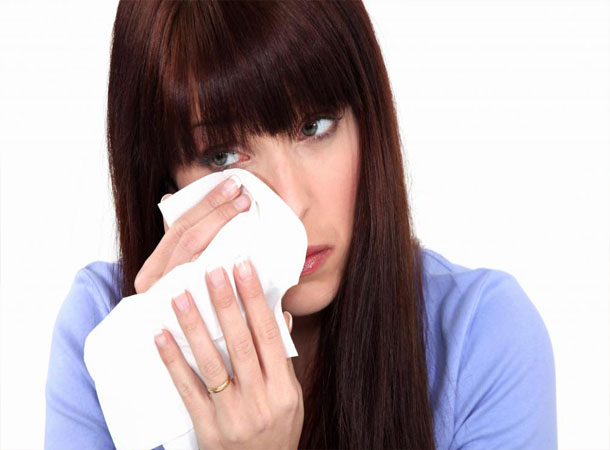Watering eye, also known as epiphora or tearing, is a condition in which there is an overflow of tears onto the face, often without a clear explanation. There is insufficient tear film drainage from the eye(s) – instead of all the tears draining through the nasolacrimal system, they overflow onto the face.
Symptoms
Watery eyes are characterised by an excess of tears, which can give the eyes a glassy look, and may result in tears running or dripping from the eyes. Some excessive tear production is natural in cold or windy environments, or if a foreign body gets into the eye. However, excessive and constant watering is not normal, and may occur for a number of reasons.
1. Avoid allergens
Eye allergies are extremely common and many things can cause them, usually air borne, from dust to pollen, mould and pet fur. They can develop at any point in life and it’s all about reducing as much contact with a suspected allergen as possible. On high pollen-count days for example, try to stay indoors if you can, and wear wrap-around glasses when you go outside. If you wear contact lenses, consider cutting down on wearing them or to switch to daily disposables to cut down on allergen build-up on your lenses.
2. Put down the smartphone and shut off the laptop
We’re hardly away from a screen, whether that’s at work or at play and our addiction to our digital advices is having a knock-on effect on our eye health. Computer vision syndrome is thought to affect between 60 and 90pc of people who work with computers, which leads to eye fatigue, where symptoms include blurred vision, watering or sometimes dry eyes and difficulty focussing. Part of the reason computers cause eye fatigue is because we tend to blink less when looking at a screen with studies suggesting that we only blink half as much when we’re on computers or smartphones in comparison to the normal rate of 18 times a minute.
3. Practise safe make-up
Eye cosmetics are safe but it’s also necessary to be scrupulous about hygiene because eye make-up can also be harbingers of germs. Replace mascaras every two to four months and never, ever wet mascara that has dried up with saliva or water. Regularly clean eye make-up applicators, and if your eyes are any way sensitive, avoid multi-tasking products and only use eye pencils on eyes and lip pencils on lips. When it comes to putting on make-up avoid anything iridescent or sparkly, which can irritate eyes, and don’t apply mascara at the base of your eyeline and try and keep away from the lash roots. If your eyes are sensitive, use products specifically designed for this problem. Also, it’s never a good idea to share eye cosmetics with someone, no matter how good a friend they are.
4. Remove your contact lenses
If your eyes just won’t seem to stop watering, try removing your contact lenses. Contacts can make watery eyes worse while also potentially preventing eye drops from working. Talk to your ophthalmologist if you think your contacts might be to blame for your watery eyes.
5. Winterproof your eyes
The calendar tells us that spring is here but with Met Eireann warning us that spring isn’t going to happen until March, we can expect some harsh weather yet to come. Winter is incredibly hard on eyes with the cold air being a natural irritant. Dry eye syndrome is a common result and strange as it sounds, one of the symptoms of this is watering eyes, because excess tears are produced to help with lubrication. On cold days, no matter how cloudy it is and how ridiculous you might feel, wear sunglasses.
6. Use eye drops or “artificial tears.”
It may sound counterintuitive to use artificial tears for watery eyes, but you can actually use eye drops to stop watery eyes. Eye drops work well when your eyes are watering because of excessive dryness. Eye drops will help to moisten and lubricate the eyes, which will lead to a decreased production of tears.
7. Make an eye compress to soothe irritated eyes
Warm compresses help to remove crust from the eyes while also working to loosen up any toxins that might be blocking your tear ducts. They also help to reduce the redness and irritation that often comes with watery eyes. Run a washcloth under warm to hot water, squeeze out the excess water, and then lay the washcloth across your eyes. Lie down and keep the cloth there for five to 10 minutes.
8. Wear sunglasses
Sunglasses shield your eyes from harsh UV rays that can cause your eyes to water. Sunglasses can also act as a shield against particles and other debris that gets swept up by the wind and could potentially blow into your eyes.
Sources:
http://www.medicalnewstoday.com
http://www.independent.ie
http://www.wikihow.com
http://jobs-odf.com.sg






